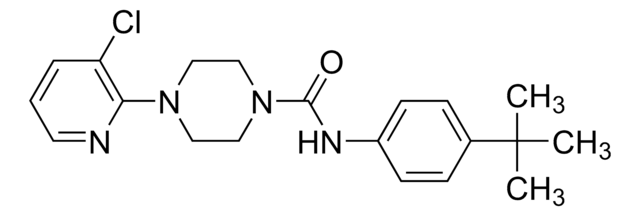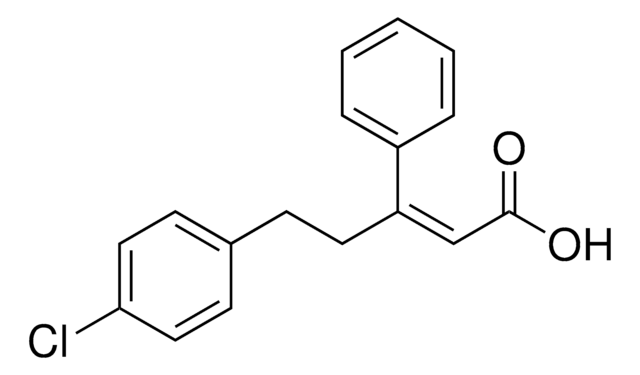SML1600
Rinvanil
≥98% (HPLC)
Synonyme(s) :
(9Z,12R)-12-Hydroxy-N-[(4-hydroxy-3-methoxyphenyl)methyl]-9-octadecenamide, N-Vanillylricinoleamide
Se connecterpour consulter vos tarifs contractuels et ceux de votre entreprise/organisme
About This Item
Formule empirique (notation de Hill):
C26H43NO4
Numéro CAS:
Poids moléculaire :
433.62
Code UNSPSC :
12352200
Nomenclature NACRES :
NA.77
Produits recommandés
Niveau de qualité
Pureté
≥98% (HPLC)
Forme
oil
Couleur
colorless to yellow
Température de stockage
2-8°C
Actions biochimiques/physiologiques
Rinvanil is a Capsaicin analogue that potently activates transient receptor potential vanilloid 1 (TRPV1) channels. Rinvanil induces neuroprotective mild hypothermia in ischemic brain injured mice through TRPV1 activation. Rinvanil exhibits potent anticancer activity in cancer cell lines including cervical (HeLa, CaSKi, ViBo) and leukemia (P388, J774, WEHI-3) cell lines. Rinvanil is not cytotoxic to normal lymphocytes.
TRPV1 (transient receptor potential vanilloid 1) is a capsaicin receptor. It is strongly expressed in sensory neurons and participates in pain perception. In brain, it regulates neuronal function, motor behaviour and neuroinflammation. Capsaicin plays an important role in the activation of TRPV1.
Code de la classe de stockage
10 - Combustible liquids
Classe de danger pour l'eau (WGK)
WGK 3
Point d'éclair (°F)
Not applicable
Point d'éclair (°C)
Not applicable
Certificats d'analyse (COA)
Recherchez un Certificats d'analyse (COA) en saisissant le numéro de lot du produit. Les numéros de lot figurent sur l'étiquette du produit après les mots "Lot" ou "Batch".
Déjà en possession de ce produit ?
Retrouvez la documentation relative aux produits que vous avez récemment achetés dans la Bibliothèque de documents.
Jin H Nam et al.
Brain : a journal of neurology, 138(Pt 12), 3610-3622 (2015-10-23)
Currently there is no neuroprotective or neurorestorative therapy for Parkinson's disease. Here we report that transient receptor potential vanilloid 1 (TRPV1) on astrocytes mediates endogenous production of ciliary neurotrophic factor (CNTF), which prevents the active degeneration of dopamine neurons and
Katy A Freed et al.
Journal of medical genetics, 48(8), 563-566 (2011-05-07)
Cystinosis is an autosomal recessive disease characterised by the abnormal accumulation of lysosomal cystine. Mutations in the cystinosin gene (CTNS) represent known causes for the disease. The major cystinosis mutation is a 57 kb deletion on human chromosome 17p13 that
Notre équipe de scientifiques dispose d'une expérience dans tous les secteurs de la recherche, notamment en sciences de la vie, science des matériaux, synthèse chimique, chromatographie, analyse et dans de nombreux autres domaines..
Contacter notre Service technique








